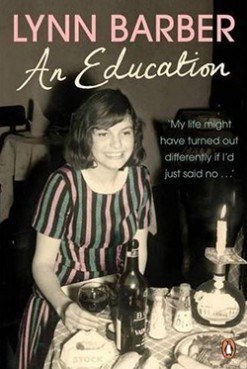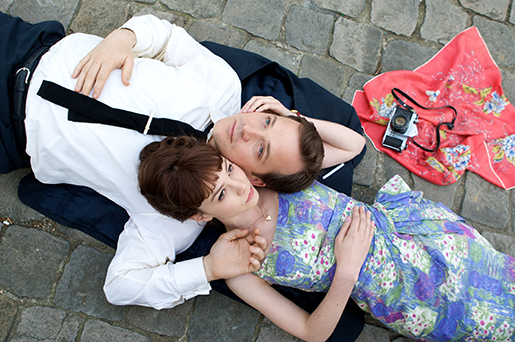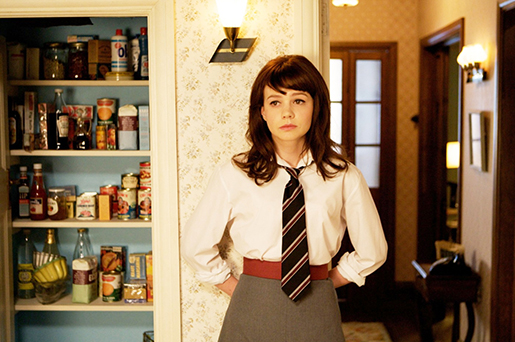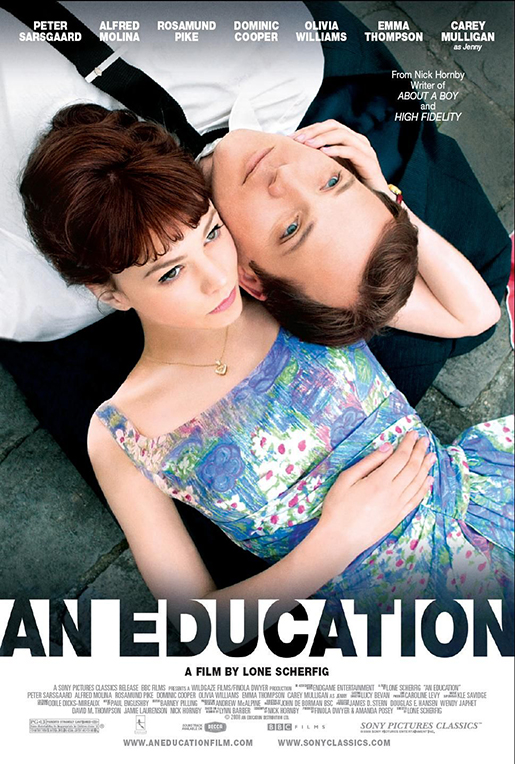Movie Review: AN EDUCATION (2009)
![]()

No Free Passes
One of the many things Lone Scherfig’s An Education gets right is show how wisdom comes suddenly. Take Jenny (Carey Mulligan, who is simply wonderful), a schoolgirl who at 16 is the brightest in her class, and fancies herself mature, sophisticated and wise. She actually does know a great deal and sometimes she is right on the money. Feeling restless and stuck in the straitlaced, lushly coloured town of Twickenham, London circa 1961, Jenny yearns for novelty and passion. This is two years before four guys from Liverpool would have turned her disillusionment on its head. For now, she sings along with her Juliette Greco LP (Sous Le Ciel De Paris) amongst other French singers in her bedroom. Those reminded of the Mario Lanza craze of Pauline (Melanie Lynskey) from Heavenly Creatures (1994) should take comfort that they are not alone. When she decides to allow herself to be courted by a 35-year-old named David (Peter Sarsgaard), know that David isn’t the only one with ulterior motives beneath the designs to woo. But she still has so much more to learn. For starters, to stay away from baddies like David.
Jenny studies vigorously in hope of going to Oxford where she can escape the mundanity of her middle class upbringing, “I’m going to talk to people who know lots and lots.” One rainy afternoon, she comes across David, who looks smart, is exceedingly charming, and drives a burgundy Bristol sports car. He offers her a ride. Eventually, she accepts. He looks harmless enough. What does David do for a living? “Property. A little art dealing. Selling this and that.” Where did he study? “I went to the University of Life. I didn’t get a good degree there.” Plus he’s Jewish, an exotic find as rare as well… Bristols! From there, Jenny is instantly smitten with this well-to-do gentleman and renegade. Jenny is so indifferent to her country and wants very much to enjoy France. To such a bored Brit, Jenny thrives to consume the cool French delights of cigarettes, Jazz and the French New Wave — Resnais, Goddard, Truffaut and Varda.
Her father Jack (Alfred Molina), a middle-class immigrant, has little sympathy for her appetites. He goes on about financial realities, forever dwelling on practicalities and studying. When Jenny considers taking a year off from school after graduating, her father asks, “What for?” This is a time where a woman’s education meant finding a suitor, not a career. Jenny is good at playing the cello, however, Jack dismisses that strength as something she’ll put aside in the working world. He is even more tough on the boys she brings home. Softening the blow is her mother Majorie (Cara Seymour) who has different ways of being both knowing and clueless as her husband. Understand that they are truly proud of their daughter and love her so. They just make the mistake of making her future sound like work when it ought to be celebrated. No wonder Jenny is attracted to David, he can open high end doors and afford her expensive things like idealism.
 Prepared with gifts, David eventually visits Jenny’s parents. Dressed in a good suit, he boasts about his Oxford education and name drops C.S. Lewis (“We just…got along!”). Why, he even uses the “Jenny’s sister” line on her mother and it works! Jack is taken by David’s appearance and reveals so much by saying “You’re not the sort of person I’d be against.” Jack and Majorie assume the relationship is platonic — a good connection to getting Jenny into Oxford. The idea, so obvious in these contemporary times, that David intends to deflower their daughter isn’t given so much of a spark. They are very much as victimized as their daughter, who relied on their protection. Later, it isn’t question of how much older this man is to their underage daughter. It becomes a question of whether he can provide a better life for her. “That’s what you need. Someone on the make.” It isn’t simple enough to sigh, “Those Europeans!” However, Jenny knows that David wants sex. She’d like to have sex with him too. It’s like discovering a new power. She is sensible enough to know 16 is too young to give up her virginity. 17 sounds right to her.
Prepared with gifts, David eventually visits Jenny’s parents. Dressed in a good suit, he boasts about his Oxford education and name drops C.S. Lewis (“We just…got along!”). Why, he even uses the “Jenny’s sister” line on her mother and it works! Jack is taken by David’s appearance and reveals so much by saying “You’re not the sort of person I’d be against.” Jack and Majorie assume the relationship is platonic — a good connection to getting Jenny into Oxford. The idea, so obvious in these contemporary times, that David intends to deflower their daughter isn’t given so much of a spark. They are very much as victimized as their daughter, who relied on their protection. Later, it isn’t question of how much older this man is to their underage daughter. It becomes a question of whether he can provide a better life for her. “That’s what you need. Someone on the make.” It isn’t simple enough to sigh, “Those Europeans!” However, Jenny knows that David wants sex. She’d like to have sex with him too. It’s like discovering a new power. She is sensible enough to know 16 is too young to give up her virginity. 17 sounds right to her.

Director Lone Scherfig has made a gem of a film — a throwback to classy Hollywood romances made half a century ago that turns subversive. This is the same Lone Scherfig who made a warm human comedy back in 2002 and titled it darkly Wilbur Wants to Kill Himself. To showcase the attention brought to the production, there is a small period detail in An Education that the invaluable AMC series Mad Men also uses, which is that in the 1960s all of the fruit is much smaller. You’ll notice it when David makes an unwholesome proposition to Jenny late one night in their hotel room. At this point, Jenny is more concerned about David’s baby talk (“You’re my Minnie Mouse!”). A good argument could be made that Jenny would have caught on sooner if she wasn’t so willing deceive herself as much as David is. It is human nature to want to be part of a con so long as the consequences can be ignored. Look at Catherine Breillat’s Fat Girl (2002) where Anaïs (Anaïs Pingot) listens skeptically to Fernando and believes him anyway.
It is no wonder why audiences and critics are going gaga over newcomer Carey Mulligan. Her sublime performance in An Education announces that she is here to stay. Now everyone has been saying it so I will say it only once… Audrey Hepburn. Watching certain scenes, it is impossible not to recall Roman Holiday (1953) and Breakfast at Tiffany’s (1961), especially when Jenny is all dolled up like Holly Golightly. However, the best follow-up to Hepburn has been with us much longer than Miss Mulligan and that is Emily Mortimer.
I still feel that’s too small a box for Mulligan because she is very much her own woman. She is so convincing as a teenager in her mannerisms and using her petiteness for good measure that one almost forgets she is really twenty-four years old. Adult actors playing high school students are often unrealistic like when Anne Hathaway — who has proved truly accomplished in comedy and drama with last year’s Get Smart and Rachel Getting Married — played a gawky teen made over in The Princess Diaries (2001) as well as countless high school-centered sitcoms. Mulligan is completely in command as Jenny — engaging, funny, headstrong and worthy of our sympathy. Like Hathaway last year, it is a given that Carey Mulligan will be nominated as Best Actress.
Peter Sarsgaard, an American actor aptly affecting an European accent, has the challenge of making David attractive and charming in a way that makes observers nervous. This he accomplishes and then some. His character reminds me a little of Ewan McGregor’s Catcher Block from Down With Love (2003). The way he suggests “a spot of supper” is so swoon-worthy that he wins our admiration despite our misgivings. He’s so good at manipulation. This can’t end well, but at least the descent down is rather dreamy. For all of his dashing smiles, wit and bravado, he leaks out tiny drips of cowardice and sneakiness until everyone is up to their waists in deceit. As a villain we love to hate, his most insidious power is being so damned lovable at first.
David invites Jenny into his social circle that include his brother Danny (Dominic Cooper) and friend Helen (Rosamund Pike). They hit the clubs, art auctions and dog races. Helen, a socialite takes the most delight in making a show of Jenny’s pretensions: “Why would you say it in French?” Her insults are served with a ferocious smile. If Helen could, she’d drown the ocean if only to obliterate the clouds where Jenny’s head is. Danny keeps his opinions to himself and exchanges looks of worry with Helen. David is a hell of a chaperon though. He has the uncanny ability to find fun and invention on their excursions. What’s more, David genuinely enjoys Jenny’s company.
The screenplay is very sly. For instance, having Helen show what a snob she is only to reveal what her values really are. There are sneaky ways of revealing contradictions and hidden convictions. Another wise decision is to know when to use Graham (Matthew Beard), a nice boy Jenny’s age, and when to drop him. After inviting Jenny out, Graham is oblivious to the subtext when one of Jenny’s friends explains, “She doesn’t have time for boys!” Seeing Graham again in the last one-third would have muddied up the drama. The film parallels the winning charm of Jenny starstruck at the beginning of love as deceptions and foul undercurrents are slowly revealed. This isn’t some romp that is safely netted by dangers extending at most for a few months or a year. The stakes become extremely high because Jenny is in danger of ruining her life. Illusions of indestructibly come with a limit of years spent.
 An Education was faithfully adapted for the screen by English novelist Nick Hornby on the short memoir of Lynn Barber, which you should definitely read. An excerpt from her book can be found at The Guardian’s The Observer.
An Education was faithfully adapted for the screen by English novelist Nick Hornby on the short memoir of Lynn Barber, which you should definitely read. An excerpt from her book can be found at The Guardian’s The Observer.
“Simon took me to an Italian place in Marylebone and of course I was dazzled. I had never been to a proper restaurant before, only to tea rooms with my parents. I didn’t understand the menu, but I loved the big pepper grinders and the heavy cutlery, the crêpe suzettes and the champagne. I was also dazzled by Simon’s conversation. Again, I understood very little of it, partly because his accent was so strange, but also because it ranged across places and activities I could hardly imagine. My knowledge of the world was based on Shakespeare, Jane Austen, George Eliot and the Brontes, and none of them had a word to say about living on a kibbutz or making Molotov cocktails. I felt I had nothing to bring to the conversational feast and blushed when Simon urged me to tell him about my schoolfriends, my teachers, my prize-winning essays. I didn’t realise then that my being a schoolgirl was a large part of my attraction.”
This is Hornby’s second screenplay credit after the UK version of Fever Pitch. Hornby (High Fideilty (2000), About A Boy (2002)) is infamous for his tight, challenging comedies that center on young men trying to connect with women using or despite their vices. His works hold insights into human nature through a real confiding confidence. An Education isn’t so much of a stretch for Hornby because Jenny’s character is just as peculiar and hopeful as Will Freeman from About A Boy, a man who truly believes that every man is an island.
Nick Hornby is one of those enlightened few who know that writing for women is not a radical departure from writing for men. Predecessors like Paul Cox for A Woman’s Tale (1991), Stephen King for Dolores Claiborne (1995), and Mike Leigh for Happy Go-Lucky(2008) demonstrate this in spades. There is no adherence to stereotypes, nor lame generalizations that keep the sexes at odds with each other and late-night comics in business. Jenny is not merely written as “a girl” as transparently as so many screenwriters in Hollywood do. Jenny is a richly drawn character with qualities good and bad, who has the freedom to grow and screw up like everyone does. In fact, there are times when Jenny isdownright nasty. The fact that I have to point this out should be as ludicrous as singling out Kathryn Bigelow for directing men so naturally in The Hurt Locker (2008). We live a society where the female perspective is treated with condescension and shallowness.
An Education begins jovially with one of the very best main title sequences of the year — right there with Moon, 500 Days of Summer, Nightwatching and Watchmen — an animated sequence of silly doodles, educational diagrams and dance steps done in chalk to the punchy jazz beats of Floyd Cramer’s On The Rebound. A very telling title relating to Jenny comes from Beth Rowley’s song You’ve Got Me Wrapped Around Your Little Finger. The filmmakers have a good sense of humour to include the theme from Percy Faith’s A Summer Place (1959). Paul Englishby’s romantic and wistful score, which is mainly based on flutes and strings, has good command of its subtlety and desire. The cinematography by John de Borman (Miss Pettigrew Lives for a Day, 2008 — Englishby also scored that film) has a subtle flavour of Old Hollywood. Everything looks natural, albeit richer. The English town possesses hues made only possible by sunlight after a light shower.

A round of supporting roles do a deft job with their characters in a limited amount of time. Lucy Bevan deserves an exquisite bouquets of flowers for casting this film. Alfred Molina is very good as a controlling father who means well. His obsession with classism is appallingly hilarious. Listen to how he says, “What are you? A teddy boy!” Cara Seymore, who deserves to be the lead in her own film someday, has small gestures that go a long way — notice the way she purses her lips. Olivia Williams is quite effective as Miss Stubbs, an ever-concerned teacher who tries to steer Jenny to safety. Williams is almost unrecognizable here, it took me four of her scenes to make me realize that she was Miss Cross from Wes Anderson’s Rushmore (1998). Emma Thompson, one of the most welcome actresses, makes short and effective work of the resolved headmistress whose tactlessness could be confused as heartlessness. Sally Hawkins — so great in Happy-Go-Lucky (2008) — has one crucial scene that is the most heartbreaking.
An Education is almost a folly of an entertainment. It is a wonder to watch a balance of enchantment and scenes that are dead serious. The most lighthearted and optimistic of its kind. It is on the opposite side miles from the creepy Joyce Chopra film Smooth Talk (1985). That film focused on the cruel disillusionment of a 15-year-old (Laura Dern) at the hands of a loathsome predator named Arnold Friend (Treat Williams) who “smooth talks” — threatens — the girl to come out of her house to play. The short story by Joyce Carol Oates Where Are You Going, Where Have You Been that Smooth Talk was based on had a much bleaker ending than the film. You’ll see what I mean that things could have been a lot worse.
The description of an adult man going after a teenage girl should lead you think it can only go into dark territories. Most filmmakers would be lead to similar conclusions. An Education doesn’t just work as a conventional cautionary tale like Little Red Riding Hood or Karen Moncrieff’s excellent Blue Car (2002) where an English teacher (David Strathairn) methodically seduces a trouble teen (Agnes Bruckner). Like Jenny, her story is more clever than that. We get why she would go out with David. He seems too good to be true, which is a good reason to find out what he’s hiding. After all, it’s fun to go on an adventure, depending that no bones get broken. Hearts are another matter. It is almost inevitable with first loves. Jenny is strong enough to endure heartbreak and everything else she must face. The reason An Education is so great is because it thrives on that very strength.

AN EDUCATION Trailer
ON THE REBOUND by Chet Atkins & Floyd Cramer (1965)
UPDATE: January 15, 2013
Back in the Fall of 2009 when my brain was buzzing from A Serious Man, Antichrist and An Education, I submitted my one and only request to the good people at Art of the Title. I was so gobsmacked by the title sequence back at VIFF 2009 that I wrote the following:
October, 18, 2009
Have you seen the main title sequence for Lone Scherfig’s “An Education”?
It’s an inspired candidate for closer analysis on your website.
Best,
Chris Beaubien
October, 19, 2009
Hi Chris,
Thanks for the feedback and suggestion, I’ve added it to our master “to-do” list and we’ll have to track that one down. Glad you’re enjoying the site.
Best,
Ian
—
Editor, Art of the Title
Three years later and here it is!
A very thorough analysis of a mighty title sequence.

© 2008 – 2024, CINELATION | Movie Reviews by Chris Beaubien. All rights reserved.

















